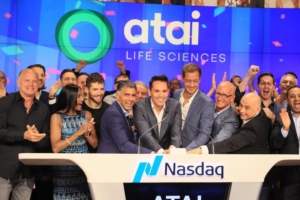
When it comes to psychedelic stocks, there are months when nothing happens, and days when months happen (to paraphrase Vladimir Lenin, who I’m SURE would LOVE his quotes being used to explain the stock market).
This week held several such days, the consequences of which will be felt for years to come, even if we are standing too close to the events themselves to predict their outcomes. First, on Monday, we learned that the CEO of Compass Pathways was being replaced. Not to be outdone, later that very same day Small Pharma announced that they also were replacing their CEO. Then, on Tuesday, Mydecine announced that they’ve filed a patent for a next-generation MDMA, with innovations that —if verifiable— could shake up the entire MDMA-as-medicine paradigm. Finally, on Wednesday, Awakn Life Sciences announced that their Phase 3 study, attempting to heal Alcohol Use Disorder with ketamine therapy, was being largely funded by the British government.
In this article, I will explain each development, and attempt to predict their long-term consequences on psychedelic stocks and medicines. Though, as already stated, without seeing even the second-order effects of these moves, any attempt to scry the future may be futile. Nevertheless, I will start dusting off the good ol’ crystal ball.
Compass Pathways Replaces their CEO
As I wrote on Monday, current Compass (Nasdaq: CMPS) CEO, George Goldsmith, is being replaced by Big Pharma veteran Kabir Nath. Coming from Otsuka Pharmaceutical, a global pharma conglomerate, Nath was Senior Managing Director of Global Pharmaceuticals, and before that he served as the President and CEO of Otsuka’s North America Pharmaceutical Business. In short, he is experienced in drug development and bringing new medicines to market.
This transition will take effect on August 1st, after which Goldsmith will stay on as Executive Chairman until December 31st, to help with the transition. In 2023, Goldsmith, who is also a co-founder of Compass, will retain his role as Chairman.
The first question to be asked is whether this transition signifies internal discontent within the Compass organization. Changing your leader is not an everyday event, and is not done without reason. This leaves two options. Either Goldsmith was forced out, or he voluntarily stepped aside. Unfortunately, we have no evidence either way, so we must make an educated guess.
A couple of factors lead me to believe this was an amicable decision. First, the apparent star quality and experience of their new CEO, Nath. Putting aside some of Otsuka’s scandals –in which it doesn’t appear Nath was involved— the Japanese company has had many successes. To use an analogy, this would be like if the Raptors had a chance to sign Steph Curry, but they had to make him captain. Of course, you would make that deal. It’s good for the organization. Next, the fact that Goldsmith is staying on at the company in a leadership role likewise signifies a lack of ill-will. If there was a palace-coup, you would expect Goldsmith to be gone —though keep an eye out early next year for Goldsmith taking a leave of absence for “family reasons.”
Given the assumption that this decision was made solely to improve Compass’ chances of bringing Comp 360 —their proprietary psilocybin— to market, we can say that at the very minimum, Compass believes that their long-term probability of success is higher now than it was before. Though, whether they are ultimately correct is another matter entirely. But from the outside looking in, this move does appear to have strengthened Compass’ team and improved the likelihood of success.
The stock market appears to like the decision. At the time of writing CMPS is up 16% since the decision was announced.
Small Pharma also Replaces their CEO
Monday’s psychedelic stocks news was not limited to Compass Pathways. As if timed, Small Pharma (TSXV: DMT | OTCQB: DMTTF) also announced that founder Peter Rands was being rotated out of the CEO role. Taking his place is George Tziras, who was Small Pharma’s Chief Business Officer. Rands maintains a leadership role in the company, and is now Chief Innovation & Intellectual Property Officer.
Prior to joining Small Pharma in 2015, Mr. Tziras —who has a finance background— was an Executive Director at Goldman Sachs. Since joining Small Pharma, he was apparently instrumental in the company raising C$63 million and its transformation from a private to a public company.
The same questions asked above regarding Compass apply here as well. Are we watching an episode of Game of Thrones, or Young Justice? (For those who haven’t hit Nerd Level 3000, Young Justice is a superhero sidekick team-up show where Robin, being the assistant to Batman, is expected to lead. However, he graciously gives up leadership to Aqualad, who is better suited.)
Again, from the outside looking in, it is very difficult to say. If the company believes that its main challenge over the next several years will be raising capital as they move their DMT-based medicines through the clinical trial process, then this may be a natural transition. On the other hand, if Rands was pushed out and exiled to America —where he will work in his new role, while most of the leadership remains in the UK— internal discontent could be in the cards for Small Pharma.
Unfortunately, I don’t even have a guess at this stage as to whether the transition was consensual or not. We just don’t have enough information. Ultimately, what will matter most for Small Pharma’s stock in the long-term is whether DMT —and their next generation-DMT— are found to be effective in clinical trials. If they are, then regardless of the drama (or lack thereof) surrounding the CEO-switch, Small Pharma likely has a bright future.
For its part, the market apparently didn’t like this move, as DMTTF is down 10% since the announcement.
Mydecine Files a Patent for a Next-Generation MDMA
On Tuesday, the major psychedelic stocks news kept rolling, as Mydecine (NEO: MYCO | OTC: MYCOF) announced that they have created next-generation MDMA analogs and had applied for a patent at the World Intellectual Property Organization.
Mydecine claims that this potentially proprietary MDMA family —named MYCO-006— has a significantly shorter duration of effect compared to traditional MDMA. Unlike MDMA, where the effects can last longer than 8 hours, MYCO-006 is targeting a 1-2 hour long duration.
If this innovation is legitimate, and if a short acting MDMA is just as effective at treating conditions such as PTSD, MYCO-006 could signify a revolution in MDMA treatment. While current studies of MDMA-assisted therapy to treat PTSD have been extremely positive —in the MAPS Phase 3 trial 88% saw their symptoms drop by 50% or more, and 67% of people improved so much they “no longer qualified for a PTSD diagnosis” — the long duration of effect poses several problems.
According to Mydecine’s Chief Medical Officer, Dr. Rakesh Jetly, “Psychedelic-assisted psychotherapy utilizing classic MDMA can take upwards of 12 hours to complete one session and a large amount of resources. By the time you’ve completed the pre-session preparation, the mystical experience, patient post-experience monitoring and post-therapy paperwork, both the patient and doctor are exhausted. Under this model, therapists would only be able to treat 2-4 patients per month.”
In other words, the long duration of effect would both skyrocket costs, as someone —be it the patient, government, or insurance providers— would have to foot the bill for 12 hour sessions, and inhibit scalability as each therapist would be limited to several patients a month. If an equally effective version of MDMA were to only last a few hours, it would mean treatment would be more accessible, scaleable, and affordable.
Now, all of that being said, we must remember that we are at the beginning of this journey. First, this hasn’t even been tested in human clinical trials. We can’t be certain that MYCO-006 works the way Mydecine says it does until we have at least some Phase 1 data showing that it is indeed safe and the effects are the same as MDMA, just shorter. Next, even if MYCO-006 is safe and shorter acting, we don’t yet know whether a shorter acting MDMA would be as effective in treating conditions such as PTSD. Maybe part of the magic is within the long duration of effect, giving you time to reflect while in an altered state of mind. We won’t be able to start answering this question until we get at least some Phase 2 data, and ultimately Phase 3 data.
This will take time. Realistically, we are likely looking at two years —best case scenario— until we see efficacy data on MYCO-006. In the interim, Mydecine faces some hefty financial challenges. As of the end of March, Mydecine had only C$264,679 in the bank, though they have raised C$4.46 million dollars since. As Mydecine has been posting net losses of between C$4 to $5 million per quarter recently, with a market cap less than C$5 million, it doesn’t take a genius to see some obvious financial struggles. In order for Mydecine to bring MYCO-006 through the clinical trial process, they will need to survive first.
Plus, there is no guarantee that other companies won’t likewise create different modified MDMAs that don’t infringe on an eventual Mydecine patent, but likewise shorten the duration of effect. We are seeing this in the psilocybin space right now.
None of these limiting factors, however, take away from the success of Mydecine. If MYCO-006 works as they hope it does, this will be huge news both for Mydecine, and the world of medicine
Unfortunately, the market has not rewarded Mydecine, as MYCOF is currently down around 26% since the announcement.
The UK Will Fund Awakn Life Sciences’ Phase 3 Trial
Rounding out our psychedelic stocks news, Awakn (NEO: AWKN | OTCQB: AWKNF) is set to launch a Phase 3 clinical trial treating Alcohol Use Disorder with ketamine-assisted therapy. While this was already one of the most exciting clinical trials happening in the psychedelic space, we were just given another reason to keep an eye on it.
On Wednesday, it was announced that the UK’s National Health Service would fund 66% of the costs for this trial, which comes out to roughly C$2.5 million. This makes it one of the first psychedelic clinical trials to receive government funding, and the very first Phase 3 trial to be partially funded by the government.
This is important, because studying psychedelic therapy will ultimately cost hundreds of millions of dollars. As governments hold the largest purses, few institutions can fund science like they can. Ultimately, if psychedelic medicines are to succeed, we will need government funding.
Awakn’s Phase 3 trial follows their massively successful Phase 2 a/b trial, “which resulted in AUD participants experiencing on average 86% abstinence at six-months post treatment versus 2% pre-trial.
The market has responded kindly to this development, as AWKNF is up 16% since the announcement.





